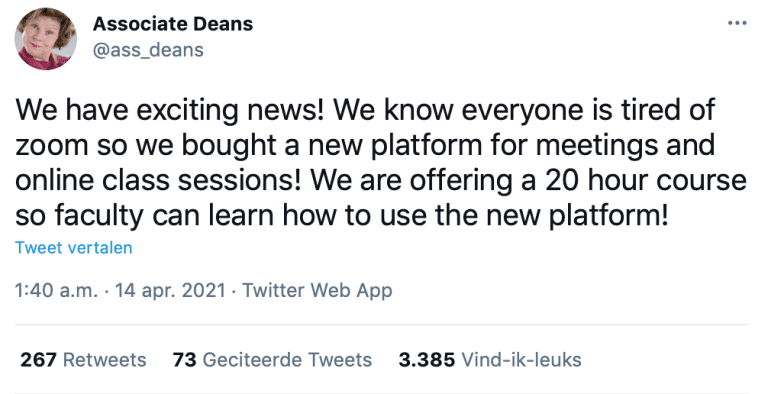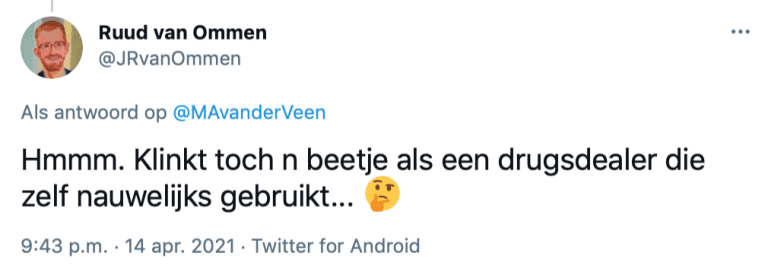To cope with the abundance of web apps at TU Delft, Monique van der Veen set up a rule that any functionality she cannot intuitively figure out in one minute will be ignored.
Monique van der Veen: “Als je je zorgen maakt over polarisatie, dan is uitgaan van ‘Ik ben het probleem’ een goede optie.” (Foto Sam Rentmeester)
Web apps are like candy. Too much of them is not good for you.

Luckily this is not the situation we have at TU Delft. We still can use Zoom and, whoever wants to, can switch to Microsoft Teams. Yet, the sentiment is still very recognisable. For educational purposes alone, I am using no less than nine Web and Client applications. These are very varied: platforms for online teaching and online examining; a learning management system (Brightspace); for submitting grades (actually three apps depending on whether the grade is for a course, a thesis or an internship) etc.
The plethora of apps doesn’t end there. There are also applications for placing orders (two actually that are not interchangeable); for lab and financial management; for time registration; for financial and personnel administration; recruitment procedures … It’s a long list.
Let’s first state that some of these applications do actually make our lives easier. In these cases the tool provides the functionality we seek, or even better, provides functionality we couldn’t imagine but are now very enthusiastic about, and the programme has great software ergonomics (we intuitively know how to use the application). For me Zoom, Microsoft Teams and ANS more or less fall in that ballpark.
Yet, many others are far off this mark. I can only manage presenting students with their grades in a timely and GDPR compliant manner via the learning management system Brightspace if support staff sit with me for an hour to set up the grading scheme properly, even after having done it several times. I find the logic of Brightspace in this regard unfathomable. Generating an official exam participant list still requires the use of a manual, while before 2020 this list was generated and sent out automatically. It was a marvel of efficiency.
Taking a course would be the last thing I do
TalentServices is the complete opposite. TalentServices is used for documenting the annual Result and Development appraisal rounds. Previously, we had a process that ran well and was based on a simple but effective Word file. That said, I do see how this process could have led to suboptimal archiving. However, TalentServices is almost incomprehensible, and set up in such a way that it is not conducive to having these important appraisal conversations, and instead frustrates the process.
Upon expressing my exasperation to my HR Manager, he suggested that I follow a course. That, however, would be the last thing I do. Taking courses to use applications in an organisation that regularly introduces a sprawl of apps with suboptimal functionality and bad software ergonomics, in a high pressure job is the last thing I will do.
So I try to cope. My personal rule is that any functionality that I cannot intuitively figure out in one minute will be ignored. And I am not the only one. In TalentServices, for example, using the option of adding PDF attachments to the software (and ignoring everything else) to the full is the manageable solution many colleagues have adopted.
I recently tweeted about the multitude of web apps TU Delft (and many other universities) keep introducing, and mentioned that in the software development company where my husband works, they use exactly two applications (Microsoft Teams and one for writing hours). My colleague R. van Ommen responded to with ‘That sounds like a drug dealer who hardly takes drugs themselves’.

Well, those are the drug dealers with the most sustainable business model. So, if you are a TU Delft employee or manager on the brink of suggesting a new application, please reconsider. Is it really needed? Can it be incorporated into an existing platform? Does it have good software ergonomics? Can it be programmed to run in the background, e.g. transferring grade lists, student list, orders etc. automatically between different systems, so that employees only get the results and none of the extra work? Can I suggest removing an existing app instead? I think it is time to consider going into ‘application rehab’ together.
Monique van der Veen is Associate Professor at the Faculty of Applied Sciences, department of Chemical Engineering. You can read about the work of her research team here and follow her on Twitter at @MAvanderVeen
Monique van der Veen / Columnist


![[Column] A multitude of web apps](https://delta.tudelft.nl/wp-content/uploads/2023/12/MoniqueVanDerVeen_4622_WEB_3.jpg)
Comments are closed.